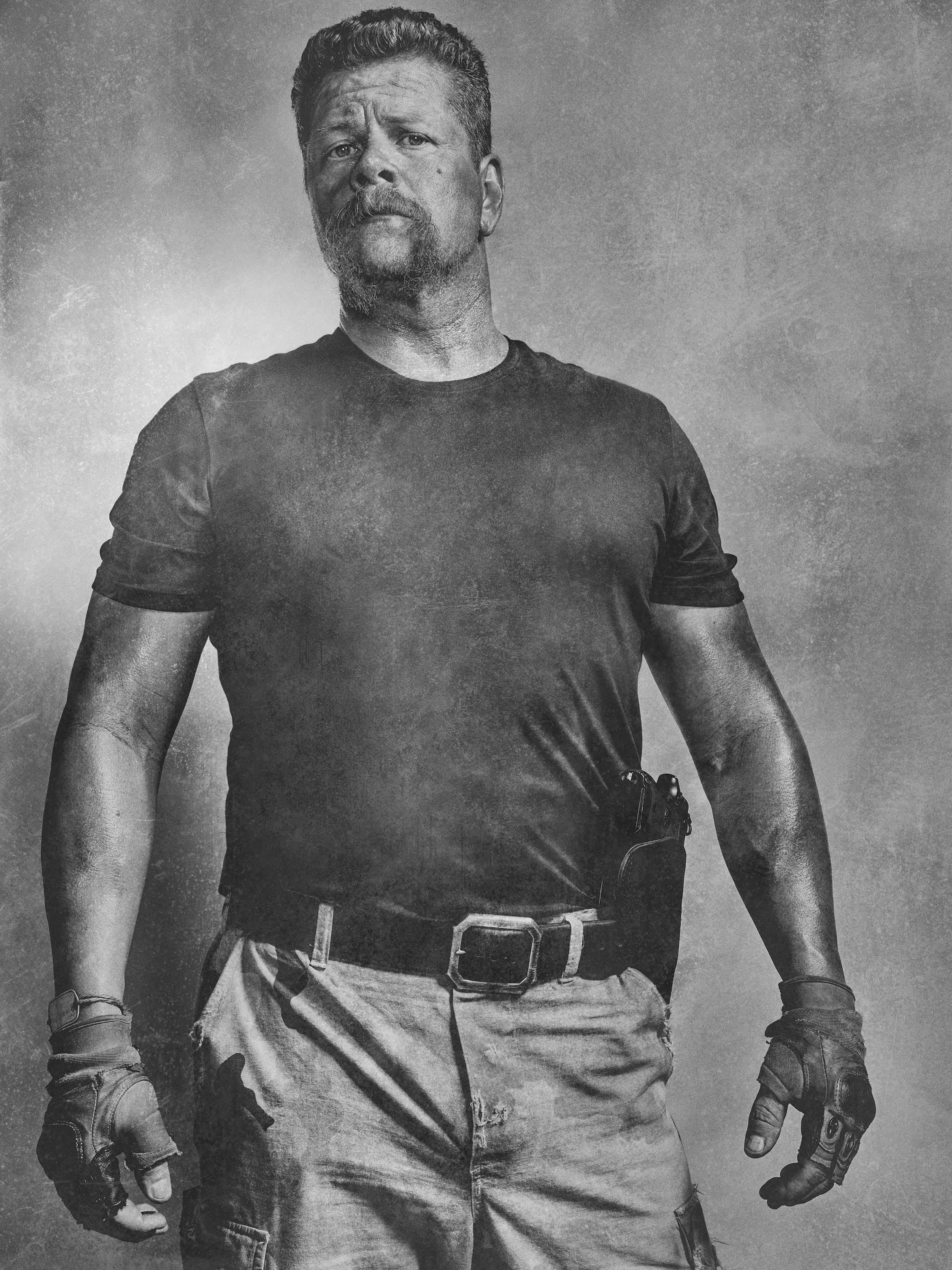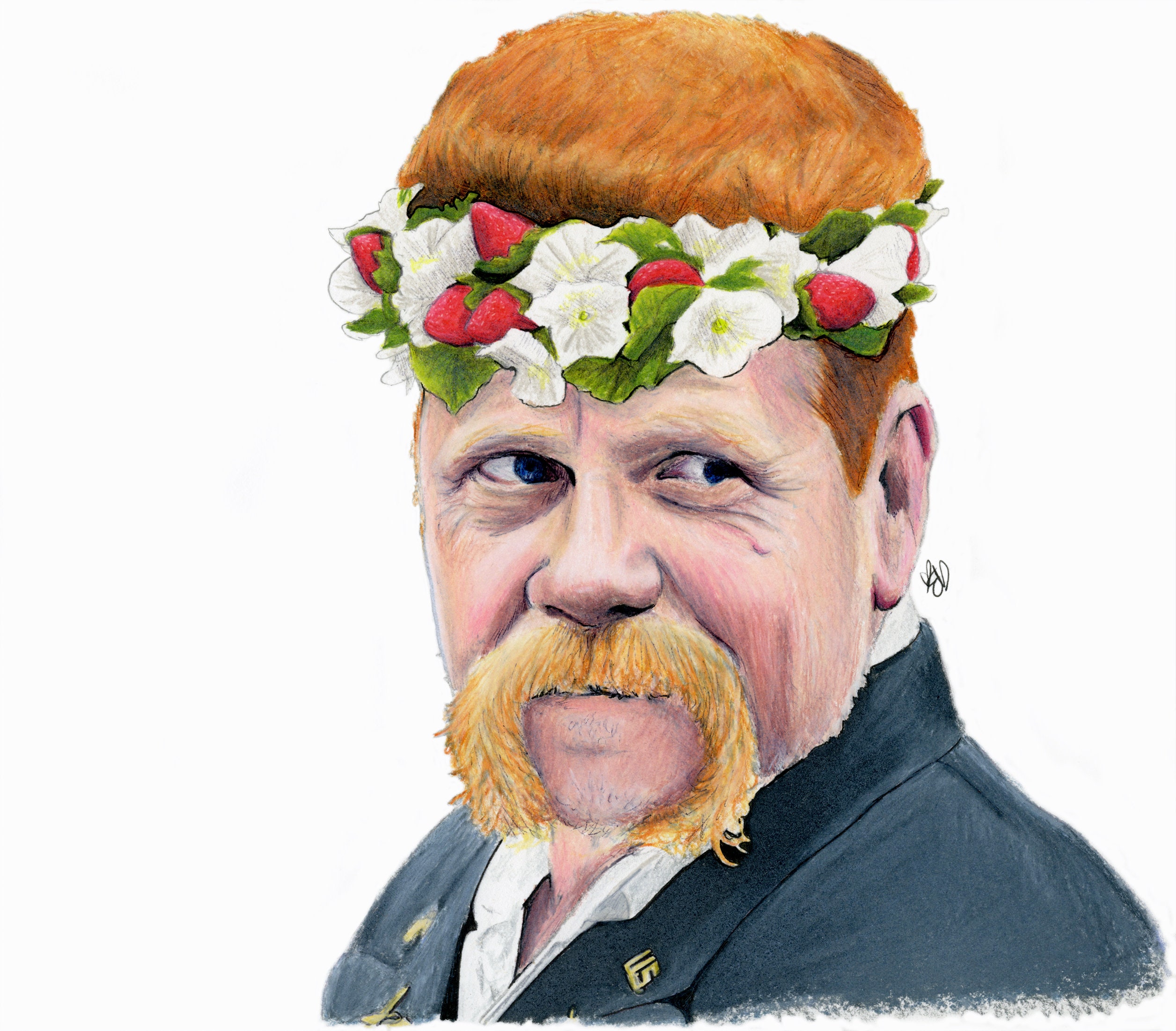Michael Cudlitz is widely recognized for his unforgettable portrayal of Abraham Ford in the hit AMC series The Walking Dead. This character became one of the most memorable figures in the zombie apocalypse universe, bringing a unique blend of military discipline, raw emotion, and leadership to the screen. Fans of the show have consistently praised Cudlitz's performance for its authenticity and depth, making Abraham Ford a fan-favorite character that continues to resonate with audiences worldwide.
Throughout the series, Abraham's journey from a military man to a key leader in the survivor community captured viewers' hearts. His distinctive red hair, mustache, and tough exterior hid a deeply emotional and complex character whose personal struggles and growth became central to the show's narrative. The character's impact on both the storyline and other characters remains significant, making Michael Cudlitz's portrayal essential to understanding the evolution of The Walking Dead's universe.
This article delves into the multifaceted aspects of Michael Cudlitz's career, focusing particularly on his groundbreaking role as Abraham Ford. We'll explore how this character transformed the show's dynamics, examine Cudlitz's acting techniques, and analyze the lasting impact of Abraham Ford on both the series and pop culture. Whether you're a long-time fan or new to The Walking Dead, this comprehensive guide will provide valuable insights into one of television's most compelling performances.
Read also:Caitlin Clarks Shower A Celebration Of Talent And Style
Table of Contents
- Michael Cudlitz Biography
- Personal Data and Biodata
- Career Journey Before The Walking Dead
- Introduction to Abraham Ford
- Abraham's Character Development
- Michael Cudlitz's Acting Techniques
- Impact on The Walking Dead Series
- Fan Reception and Cultural Impact
- Career After The Walking Dead
- Professional Contributions to Television
- Conclusion and Final Thoughts
Michael Cudlitz Biography
Michael Cudlitz was born on January 29, 1964, in Queens, New York, and grew up in a working-class family that valued hard work and dedication. His journey to becoming an actor began with a strong foundation in theater, where he developed his craft through various stage productions. Cudlitz's early career included numerous guest appearances on popular television shows, gradually building his reputation as a versatile character actor.
Before landing his breakthrough role in The Walking Dead, Cudlitz established himself through notable performances in series such as Southland, where he played Officer John Cooper. This role demonstrated his ability to portray complex characters with depth and authenticity, earning him critical acclaim from both audiences and industry professionals. His consistent delivery of powerful performances across different genres prepared him for the demanding role of Abraham Ford.
Personal Data and Biodata
| Full Name | Michael Cudlitz |
|---|---|
| Date of Birth | January 29, 1964 |
| Place of Birth | Queens, New York, USA |
| Occupation | Actor, Director, Voice Actor |
| Years Active | 1987 - Present |
| Notable Works | The Walking Dead, Southland, A River Runs Through It |
| Education | California Institute of the Arts |
| Awards | Nominated for Critics' Choice Television Award |
Career Journey Before The Walking Dead
Michael Cudlitz's career trajectory before joining The Walking Dead demonstrates his dedication and growth in the entertainment industry. He began his professional acting career in the late 1980s, appearing in various television shows and films that showcased his range as an actor. His breakthrough came with his role in the critically acclaimed film A River Runs Through It (1992), where he delivered a memorable performance that caught the attention of industry professionals.
Throughout the 1990s and early 2000s, Cudlitz built a solid reputation through his work in both film and television. Some of his notable performances include roles in Band of Brothers (2001), where he played Sergeant Denver "Bull" Randleman, and numerous guest appearances in popular series such as ER, Law & Order, and NYPD Blue. These roles helped him refine his craft and develop the strong screen presence that would later serve him well in The Walking Dead.
His experience in military roles, particularly in Band of Brothers, proved invaluable when he was cast as Abraham Ford. The authenticity he brought to military characters stemmed from extensive research and preparation, including studying military protocols and working closely with veterans. This dedication to character development became a hallmark of his acting approach and contributed significantly to his success in portraying Abraham Ford.
Introduction to Abraham Ford
Abraham Ford first appeared in The Walking Dead during the show's fifth season, making an immediate impact with his commanding presence and distinctive military background. As a former sergeant in the United States Army, Abraham brought a unique perspective to the survivor group, combining military discipline with a raw emotional intensity that set him apart from other characters. His introduction coincided with the show's expansion into new narrative territories, providing a fresh dynamic to the established group dynamics.
Read also:Unraveling The Mystery Of Yodit Tewoldes Husband
The character's backstory revealed a man who had lost everything in the early days of the apocalypse – his family, his sense of purpose, and his will to live. However, through his journey with Eugene Porter and later with Rick Grimes' group, Abraham rediscovered his purpose and became a crucial leader in the fight for survival. His signature red hair and mustache, along with his trademark military gear, became instantly recognizable symbols of his character.
Abraham's relationship with other characters, particularly his romantic involvement with Sasha Williams and his mentorship of Eugene Porter, added layers of complexity to his personality. His unwavering determination and willingness to sacrifice for the greater good made him a natural leader and a vital member of Rick's team. The character's development throughout his time on the show demonstrated remarkable growth, from a broken man seeking redemption to a confident leader willing to make the ultimate sacrifice.
Abraham's Character Development
Leadership Qualities
Abraham Ford's leadership qualities emerged as one of his most defining characteristics throughout his time in The Walking Dead. His military background provided him with a strategic mindset and organizational skills that proved invaluable in the chaotic world of the apocalypse. Unlike traditional military leaders, however, Abraham's approach combined discipline with genuine compassion for his fellow survivors. He understood the importance of morale and mental health in maintaining group cohesion, often serving as both a tactical leader and emotional support for his team.
One of Abraham's most notable leadership traits was his ability to adapt his military training to civilian circumstances. He recognized that survival in the apocalypse required more than just following orders – it demanded flexibility, empathy, and the ability to inspire others. His leadership style evolved from rigid military protocol to a more nuanced approach that valued individual contributions while maintaining necessary structure. This evolution was particularly evident in his interactions with Rick Grimes, where their leadership styles complemented each other to create a stronger, more effective team.
Emotional Depth
Despite his tough exterior, Abraham Ford possessed remarkable emotional depth that resonated with audiences. His personal struggles with PTSD, survivor's guilt, and the loss of his family were masterfully portrayed through Cudlitz's performance. The character's journey from a broken man contemplating suicide to a confident leader willing to sacrifice everything for others demonstrated remarkable emotional growth. His relationship with Eugene Porter, in particular, showcased his capacity for compassion and mentorship.
Abraham's emotional complexity was further explored through his romantic relationship with Sasha Williams. Their connection revealed a vulnerable side to his character, showing that beneath the military exterior lay a man capable of deep love and emotional connection. This relationship, along with his friendship with Rosita Espinosa, highlighted his ability to form meaningful bonds while maintaining his leadership responsibilities. The character's emotional journey provided a powerful narrative about redemption, purpose, and the human capacity for growth even in the most challenging circumstances.
Michael Cudlitz's Acting Techniques
Michael Cudlitz's portrayal of Abraham Ford showcased his mastery of several sophisticated acting techniques that brought depth and authenticity to the character. One of his most notable approaches was his use of physical transformation, where he meticulously maintained Abraham's distinctive military posture and movement patterns. This included specific details such as the way Abraham carried himself, his precise military gait, and his authoritative body language, all of which helped establish the character's military background without needing explicit dialogue.
Cudlitz employed method acting techniques to fully embody Abraham's emotional state, particularly when portraying intense scenes involving loss or conflict. He developed a detailed backstory for Abraham beyond what was written in the script, creating a rich internal world that informed his performance. This approach allowed him to deliver nuanced reactions and subtle emotional cues that made Abraham's journey feel authentic and relatable to viewers. His preparation included extensive research into military psychology and post-traumatic stress, which informed his portrayal of Abraham's internal struggles.
The actor's vocal performance was another crucial element in bringing Abraham to life. Cudlitz developed a distinctive vocal pattern for the character, characterized by a gravelly tone and measured delivery that reflected both Abraham's military background and his emotional state. He carefully modulated his voice to convey different levels of intensity, from quiet moments of vulnerability to powerful declarations of purpose. This vocal control, combined with precise timing and rhythm in his delivery, helped create memorable scenes that resonated with audiences.
Impact on The Walking Dead Series
Abraham Ford's presence significantly influenced the narrative direction and character dynamics of The Walking Dead, particularly during his tenure from seasons five through seven. His introduction marked a turning point in the series, bringing a new level of military strategy and leadership that complemented Rick Grimes' evolving approach to survival. Abraham's military expertise introduced more structured tactical planning to the group's operations, elevating the show's portrayal of survival strategies and conflict resolution.
The character's impact extended beyond tactical contributions, as his presence created complex dynamics within the survivor group. His relationship with Eugene Porter provided one of the show's most compelling mentorship arcs, while his friendship with Rosita Espinosa explored themes of loyalty and trust. Abraham's interactions with other key characters, particularly his romantic involvement with Sasha Williams, added emotional depth to the series and created new narrative threads that continued to influence the show even after his departure.
Abraham's ultimate sacrifice in season seven served as a pivotal moment in The Walking Dead's storyline, demonstrating the show's willingness to take bold narrative risks and establishing a new standard for character development and resolution. This event had lasting repercussions on the remaining characters, particularly Rosita and Eugene, whose story arcs were profoundly shaped by Abraham's influence. The character's legacy continued to affect decision-making and group dynamics throughout subsequent seasons, cementing his importance to the series' overall narrative structure.
Fan Reception and Cultural Impact
Michael Cudlitz's portrayal of Abraham Ford received overwhelmingly positive reception from both fans and critics, establishing the character as one of The Walking Dead's most beloved figures. Audience response metrics, including social media engagement and viewership statistics, showed significant spikes during Abraham's most pivotal episodes, indicating his popularity among viewers. Fan communities across various platforms consistently ranked Abraham among the top characters in the series, praising Cudlitz's ability to balance military authority with emotional vulnerability.
Critical reception highlighted Cudlitz's nuanced performance, with many reviewers noting how he elevated the source material from the comics through his interpretation of Abraham. Major entertainment publications praised his ability to bring depth to what could have been a stereotypical military character, particularly in scenes requiring emotional intensity or leadership presence. The character's distinctive appearance and mannerisms became cultural touchstones within The Walking Dead fandom, inspiring numerous fan artworks, cosplay representations, and online discussions.
Abraham's cultural impact extended beyond the show itself, influencing discussions about leadership and redemption in post-apocalyptic narratives. His character became a reference point for examining themes of military service and PTSD in popular media, contributing to broader conversations

